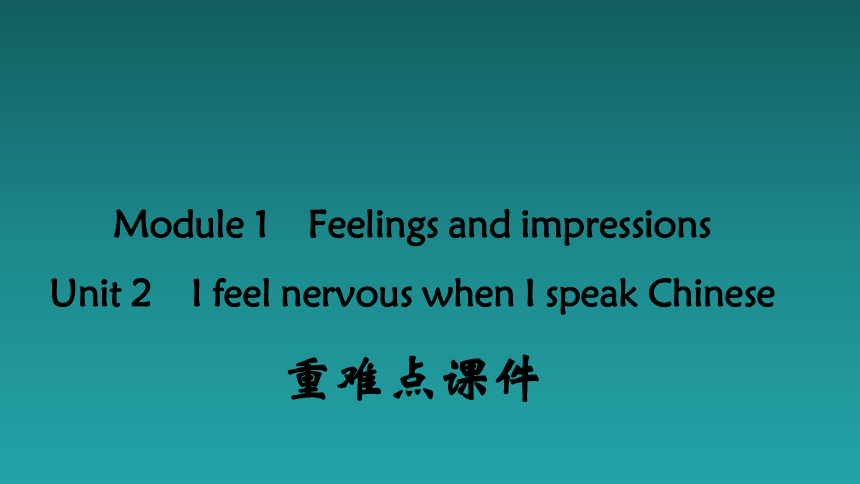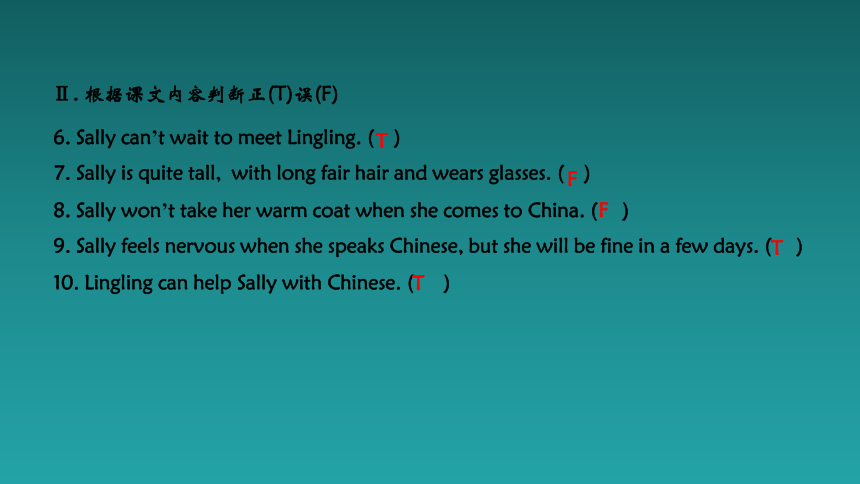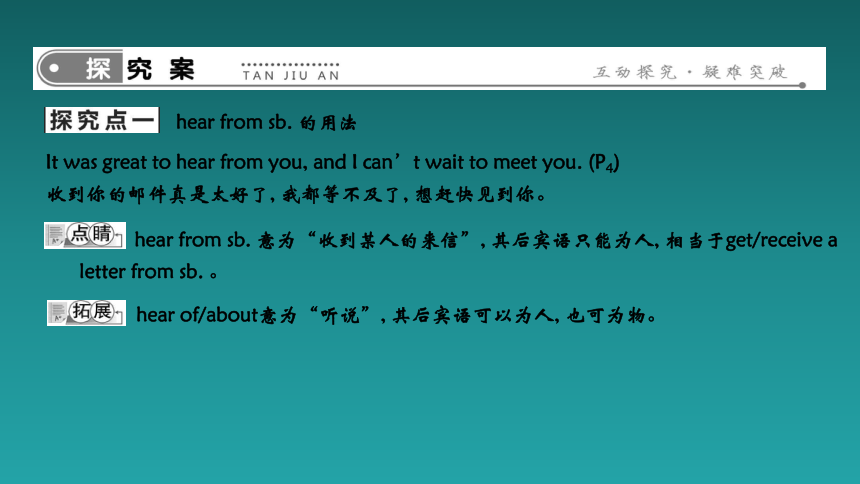外研版八年级下册 Module1Feelings and impressions Unit2 I feel nervous when I speak Chinese .重难点课件(共17张PPT)
文档属性
| 名称 | 外研版八年级下册 Module1Feelings and impressions Unit2 I feel nervous when I speak Chinese .重难点课件(共17张PPT) |

|
|
| 格式 | ppt | ||
| 文件大小 | 2.0MB | ||
| 资源类型 | 教案 | ||
| 版本资源 | 外研版 | ||
| 科目 | 英语 | ||
| 更新时间 | 2022-06-13 00:00:00 | ||
图片预览







文档简介
(共17张PPT)
Module 1 Feelings and impressions
Unit 2 I feel nervous when I speak Chinese
重难点课件
Ⅰ. 读句子记单词/短语
1. It was great to hear from you, and I can’t wait to meet you.
收到……的来信
等不及
2. My brother is in the school tennis team—I’m very proud of him!
为……而感到骄傲
hear from
can’t wait
be proud of
/take pride in
3. I feel nervous when I speak Chinese, but I’ll be fine in a few days.
adj. 情绪不安的;紧张的
prep. 在……之后;参加, 加入;在……期间;用, 按照, 以(某方式或风格)
4. Oh, I’m afraid of flying too.
担心;害怕
5. She asked me to help her with her English homework because I am good
at English.
请某人做某事
帮助某人做某事
擅长
nervous
in
be afraid of
ask sb. to do sth.
help sb. with sth.
be good at
6. Sally can’t wait to meet Lingling. ( )
7. Sally is quite tall, with long fair hair and wears glasses. ( )
8. Sally won’t take her warm coat when she comes to China. ( )
9. Sally feels nervous when she speaks Chinese, but she will be fine in a few days. ( )
10. Lingling can help Sally with Chinese. ( )
Ⅱ. 根据课文内容判断正(T)误(F)
T
F
F
T
T
hear from sb. 的用法
It was great to hear from you, and I can’t wait to meet you. (P4)
收到你的邮件真是太好了, 我都等不及了, 想赶快见到你。
hear from sb. 意为“收到某人的来信”, 其后宾语只能为人, 相当于get/receive a letter from sb. 。
hear of/about意为“听说”, 其后宾语可以为人, 也可为物。
1. I got a letter from Danny yesterday. (改为同义句)
I Danny yesterday.
2. 露西没有听说过霍尊。
Lucy didn’t Huo Zun.
heard
from
hear
of/about
be proud of的用法
My brother is in the school tennis team—I’m very proud of him!(P4)
我哥哥在学校的网球队——我很为他感到骄傲!
be proud of意为“为……而感到骄傲”, 其中of为介词, 后接名词、代词或动词-ing形式。
1. be proud to do. . . 表示“为做……而感到骄傲/自豪”。
2. proud的名词为pride, 构成短语:take pride in意为“为……感到骄傲”;
the pride of意为“……的骄傲”。
My parents are proud of me. =I am the pride of my parents.
我的父母为我感到骄傲。
1. Xinjiang is getting better and better, so we should take pride in our hometown. (改为同义句)
Xinjiang is getting better and better, so we should be . our hometown.
2. We take (自豪, 骄傲) in our traditional culture. (2018孝感)
3. I’m (骄傲) to help people see again.
of
proud
pride
proud
message的用法
Thanks for your last message. (P4)
谢谢你的上一封电子邮件。
message用作可数名词, 意为“口信;信息”, 常见的短语是leave a message“留言;留口信”, take a message (for sb. )“(为某人)捎口信”。
辨析:message, news与 information
message 可数名词, 含义较广, 可指书面、口头、无线电等多种渠道传来的信息, 因而有“消息、口信、电报”等意思。
news 不可数名词, 含义狭窄, 主要是通过报纸、电台、电视等新闻媒介向公众报道的最新消息, 也可指原来未曾听到过而现在听到的消息。
information 不可数名词, 意为“信息”, 指在阅读、观察、谈话或者书信中特别关注的消息、资料等, 侧重内容。
1. When Peter comes, please ask him to leave a .
A. news B. message
C. sentence D. information
2. The students didn’t find much about the topic on that website.
A. message B. passage
C. information D. story
how+动词不定式的用法
I’m always sorry when I don’t know how to do things in the right way. . .
(P4)当我不知道怎样以正确的方式做事时, 我总是觉得很难过……
how+to do sth. 意为“如何去做”, 在句子中作宾语。
疑问词+动词不定式, 常见的还有:
when+to do;what+to do;which+to do;where+to do等。
1. I really don’t know this question. It is too hard.
A. which to answer B. how to answer
C. what to answer D. when to answer
2. —Have you decided when
—Yes, tomorrow morning.
A. will you leave B. are you leaving
C. to leave
be afraid of的用法
Oh, I’m afraid of flying too. (P4)哦, 我也害怕坐飞机。
be afraid of 意为“害怕/担心……”后接名词、代词和动词-ing形式。
1. 那个小女孩害怕狗, 因而她不敢养宠物狗。
The little girl the dog, so she . have a pet dog.
2. 恐怕你不能在这儿吸烟。
you can’t smoke here.
is
afraid
of
is
afraid
to
I’m
afraid
thanks for的用法
Thanks for your last message. (P4)
谢谢你的上一封电子邮件。
Thanks for telling me about your hobbies. (P4)
谢谢你告诉我关于你的爱好。
thanks for意为“因……而感谢”。thanks相当于 thank you, for强调为何而感谢, 后接名词或v. -ing。
thanks to表示原因, 意为“由于”、“多亏”, to表示感谢的对象。
1. 谢谢你邀请我们参加这个比赛。
inviting us to take part in the competition.
2. 多亏了微信, 我们可以和朋友更好地交流。
WeChat, we can communicate better with our friends.
Thanks
for
Thanks
to
Module 1 Feelings and impressions
Unit 2 I feel nervous when I speak Chinese
重难点课件
Ⅰ. 读句子记单词/短语
1. It was great to hear from you, and I can’t wait to meet you.
收到……的来信
等不及
2. My brother is in the school tennis team—I’m very proud of him!
为……而感到骄傲
hear from
can’t wait
be proud of
/take pride in
3. I feel nervous when I speak Chinese, but I’ll be fine in a few days.
adj. 情绪不安的;紧张的
prep. 在……之后;参加, 加入;在……期间;用, 按照, 以(某方式或风格)
4. Oh, I’m afraid of flying too.
担心;害怕
5. She asked me to help her with her English homework because I am good
at English.
请某人做某事
帮助某人做某事
擅长
nervous
in
be afraid of
ask sb. to do sth.
help sb. with sth.
be good at
6. Sally can’t wait to meet Lingling. ( )
7. Sally is quite tall, with long fair hair and wears glasses. ( )
8. Sally won’t take her warm coat when she comes to China. ( )
9. Sally feels nervous when she speaks Chinese, but she will be fine in a few days. ( )
10. Lingling can help Sally with Chinese. ( )
Ⅱ. 根据课文内容判断正(T)误(F)
T
F
F
T
T
hear from sb. 的用法
It was great to hear from you, and I can’t wait to meet you. (P4)
收到你的邮件真是太好了, 我都等不及了, 想赶快见到你。
hear from sb. 意为“收到某人的来信”, 其后宾语只能为人, 相当于get/receive a letter from sb. 。
hear of/about意为“听说”, 其后宾语可以为人, 也可为物。
1. I got a letter from Danny yesterday. (改为同义句)
I Danny yesterday.
2. 露西没有听说过霍尊。
Lucy didn’t Huo Zun.
heard
from
hear
of/about
be proud of的用法
My brother is in the school tennis team—I’m very proud of him!(P4)
我哥哥在学校的网球队——我很为他感到骄傲!
be proud of意为“为……而感到骄傲”, 其中of为介词, 后接名词、代词或动词-ing形式。
1. be proud to do. . . 表示“为做……而感到骄傲/自豪”。
2. proud的名词为pride, 构成短语:take pride in意为“为……感到骄傲”;
the pride of意为“……的骄傲”。
My parents are proud of me. =I am the pride of my parents.
我的父母为我感到骄傲。
1. Xinjiang is getting better and better, so we should take pride in our hometown. (改为同义句)
Xinjiang is getting better and better, so we should be . our hometown.
2. We take (自豪, 骄傲) in our traditional culture. (2018孝感)
3. I’m (骄傲) to help people see again.
of
proud
pride
proud
message的用法
Thanks for your last message. (P4)
谢谢你的上一封电子邮件。
message用作可数名词, 意为“口信;信息”, 常见的短语是leave a message“留言;留口信”, take a message (for sb. )“(为某人)捎口信”。
辨析:message, news与 information
message 可数名词, 含义较广, 可指书面、口头、无线电等多种渠道传来的信息, 因而有“消息、口信、电报”等意思。
news 不可数名词, 含义狭窄, 主要是通过报纸、电台、电视等新闻媒介向公众报道的最新消息, 也可指原来未曾听到过而现在听到的消息。
information 不可数名词, 意为“信息”, 指在阅读、观察、谈话或者书信中特别关注的消息、资料等, 侧重内容。
1. When Peter comes, please ask him to leave a .
A. news B. message
C. sentence D. information
2. The students didn’t find much about the topic on that website.
A. message B. passage
C. information D. story
how+动词不定式的用法
I’m always sorry when I don’t know how to do things in the right way. . .
(P4)当我不知道怎样以正确的方式做事时, 我总是觉得很难过……
how+to do sth. 意为“如何去做”, 在句子中作宾语。
疑问词+动词不定式, 常见的还有:
when+to do;what+to do;which+to do;where+to do等。
1. I really don’t know this question. It is too hard.
A. which to answer B. how to answer
C. what to answer D. when to answer
2. —Have you decided when
—Yes, tomorrow morning.
A. will you leave B. are you leaving
C. to leave
be afraid of的用法
Oh, I’m afraid of flying too. (P4)哦, 我也害怕坐飞机。
be afraid of 意为“害怕/担心……”后接名词、代词和动词-ing形式。
1. 那个小女孩害怕狗, 因而她不敢养宠物狗。
The little girl the dog, so she . have a pet dog.
2. 恐怕你不能在这儿吸烟。
you can’t smoke here.
is
afraid
of
is
afraid
to
I’m
afraid
thanks for的用法
Thanks for your last message. (P4)
谢谢你的上一封电子邮件。
Thanks for telling me about your hobbies. (P4)
谢谢你告诉我关于你的爱好。
thanks for意为“因……而感谢”。thanks相当于 thank you, for强调为何而感谢, 后接名词或v. -ing。
thanks to表示原因, 意为“由于”、“多亏”, to表示感谢的对象。
1. 谢谢你邀请我们参加这个比赛。
inviting us to take part in the competition.
2. 多亏了微信, 我们可以和朋友更好地交流。
WeChat, we can communicate better with our friends.
Thanks
for
Thanks
to
同课章节目录
- Module 1 Feelings and impressions
- Unit 1 It smells delicious.
- Unit 2 I feel nervous when I speak Chinese .
- Unit 3 Language in use
- Module 2 Experiences
- Unit 1 I've also entered lots of speaking competi
- Unit 2 They have seen the Pyramids.
- Unit 3 Language in use
- Module 3 Journey to space
- Unit 1 Has it arrived yet?
- Unit 2 We have not found life on any other planet
- Unit 3 Language in use
- Module 4 Seeing the docto
- Unit 1 I haven't done much exercise since I got m
- Unit 2 We have played football for a year now
- Unit 3 Language in use
- Module 5 Cartoons
- Unit 1 It's time to watch a cartoon.
- Unit 2 Tintin has been popular for over eighty yea
- Unit 3 Language in use
- Revision module A
- Module 6 Hobbies
- Unit 1 Do you collect anything ?
- Unit 2 Hobbies can make you grow as a person.
- Unit 3 Language in use
- Module 7 Summer in Los Angeles
- Unit 1 Please write to me and send me some photos
- Unit 2 Fill out a form and come to learn English
- Unit 3 Language in use
- Module 8 Time off
- Unit 1 I can hardly believe we are in the city ce
- Unit 2 We thought somebody was moving about
- Unit 3 Language in use
- Module 9 Friendship
- Unit 1 Could I ask if you've mentioned this to he
- Unit 2 I believe that the world is what you think
- Unit 3 Language in use
- Module 10 On the radio
- Unit 1 I hope that you can join us one day
- Unit 2 It seemed that they were speaking to me in
- Unit 3 Language in use
- Revision module B
